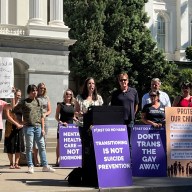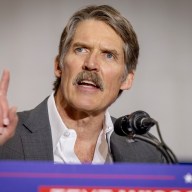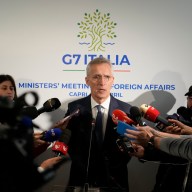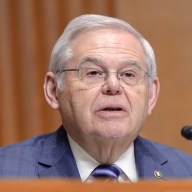TEGUCIGALPA, Honduras – Ousted President Manuel Zelaya was kept from landing at the main Honduras airport Sunday because the runway was blocked by military vehicles and groups of soldiers, some of them clashing with a crowd of thousands outside.
His Venezuelan pilots circled around the airport and decided not to risk a crash.
Zelaya instead landed in Nicaragua on his way to El Salvador, and vowed to try again Monday or Tuesday in his high-stakes effort to return to power in a country where all branches of government have lined up against him.
“I am the commander of the armed forces, elected by the people, and I ask the armed forces to comply with the order to open the airport so that there is no problem in landing and embracing my people,” Zelaya said from the plane. “Today I feel like I have sufficient spiritual strength, blessed with the blood of Christ, to be able to arrive there and raise the crucifix.”
But interim President Roberto Micheletti insisted on keeping him out, and said he won’t negotiate until “things return to normal.”
“We will be here until the country calms down,” Micheletti said. “We are the authentic representatives of the people.”
Micheletti also accused Nicaragua of moving troops in an attempt at psychological intimidation, and warned them not to cross into Honduras, “because we’re ready to defend our border.” Nicaraguan President Daniel Ortega called the allegation “totally false.”
Violence broke out among the huge crowd surrounding the airport, with at least one man killed – shot in the head from inside the airport as people tried to break through a security fence, according to an Associated Press photographer at the scene. At least 30 people were treated for injuries, the Red Cross said, after security forces fired warning shots and tear gas.
When Zelaya’s plane was turned away, his supporters began chanting “We want blue helmets!” – a reference to U.N. peacekeepers.
Karin Antunez, 27, was in tears.
“We’re scared. We feel sad because these coup soldiers won’t let Mel return, but we’re not going to back down,” she said. “We’re the people and we’re going to keep marching so that our president comes home.”
Zelaya called on the United Nations, the OAS, the United States and European countries to “do something with this repressive regime.”
“We should look for an immediate solution,” Zelaya told Venezuela’s Telesur network. He then met with Ortega before leaving for consultations in El Salvador with the presidents of Argentina, Paraguay and Ecuador and the secretary-general of the Organization of American States, Jose Miguel Insulza, who flew there from Washington.
Zelaya won wide international support after his military ouster, but the presidents decided it was too dangerous to fly on Zelaya’s plane, which carried only his close advisers and staff, two journalists from the Venezuela-based network Telesur and U.N. General Assembly President Miguel D’Escoto Brockmann, a leftist Nicaraguan priest and former foreign minister.
Honduras’ new government has vowed to arrest Zelaya for 18 alleged criminal acts including treason and failing to implement more than 80 laws approved by Congress since taking office in 2006. Zelaya also refused to comply with a Supreme Court ruling against his planned referendum on whether to hold an assembly to consider changing the constitution.
Critics feared Zelaya might try to extend his rule and cement presidential power in ways similar to what his ally Hugo Chavez has done in Venezuela.
But instead of prosecuting him or trying to defeat him at the ballot box, his political opponents sent masked soldiers to fly Zelaya out of the country at gunpoint, and Congress installed Micheletti in his place.
The military solution drew condemnation at the United Nations, and Honduras was suspended by the OAS. Many called it a huge step backward for democracy, and no nation has recognized the new government. President Barack Obama has united with Chavez and conservative Colombian President Alvaro Uribe in insisting on Zelaya’s return.
Without OAS membership, the isolated interim government faces trade sanctions and the loss of hundreds of millions of dollars in subsidized oil, aid and loans for the impoverished nation.
Zelaya, a wealthy rancher who has shifted to left during his presidency, has drawn most of his support from the working and middle classes, while his opponents are based in the ranks of the well-to-do.
Micheletti’s vice foreign minister, Martha Lorena Alvarado, said the interim government sent the OAS a letter expressing “willingness to conduct conversations in good faith.” In Washington, senior Obama administration officials took that as a positive sign.
Speaking on condition of anonymity under ground rules set by the State Department, the officials said the United States and other OAS member countries are co-ordinating contacts and outreach to facilitate a resolution, despite their insistence on having no formal relations with the interim government.
The immediate concern, however, was avoiding more bloodshed. Both critics and supporters of Zelaya have staged large demonstrations. The country’s Roman Catholic archbishop and its human rights commissioner urged Zelaya to stay away to avoid provoking them.
Moments after Zelaya’s plane was turned away, about a dozen trucks filled with police ordered everyone off the streets, imposing a sunrise-to-sunset curfew.
“This is a war,” said Matias Sauceda, 65, a human rights activist. “Imagine – things are so bad, that the president is in the air and they don’t let him land.”
–
Weissert reported from Tegucigalpa and Ikeda from Washington. Associated Press writers Freddy Cuevas, Marcos Aleman and Esteban Felix in Tegucigalpa; and Robert Burns and Jeanneth Valdivieso in Washington contributed to this report.















